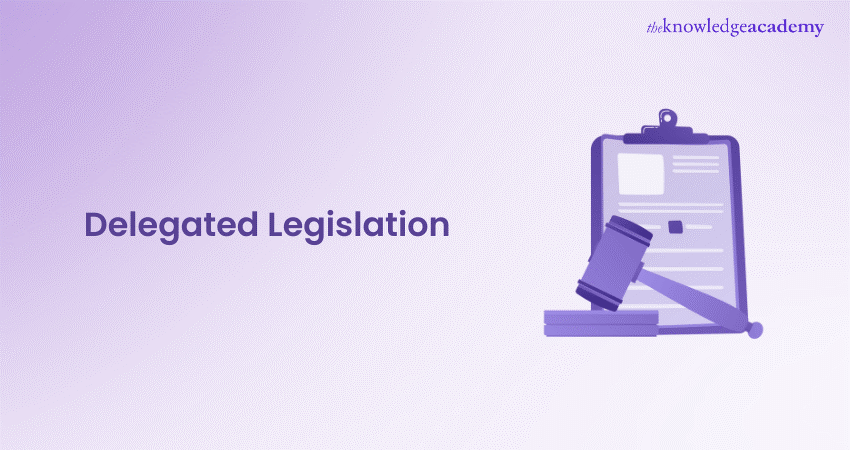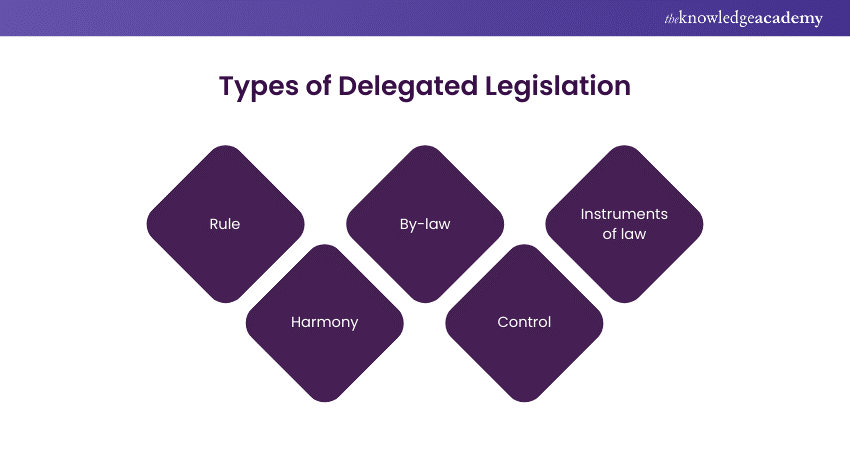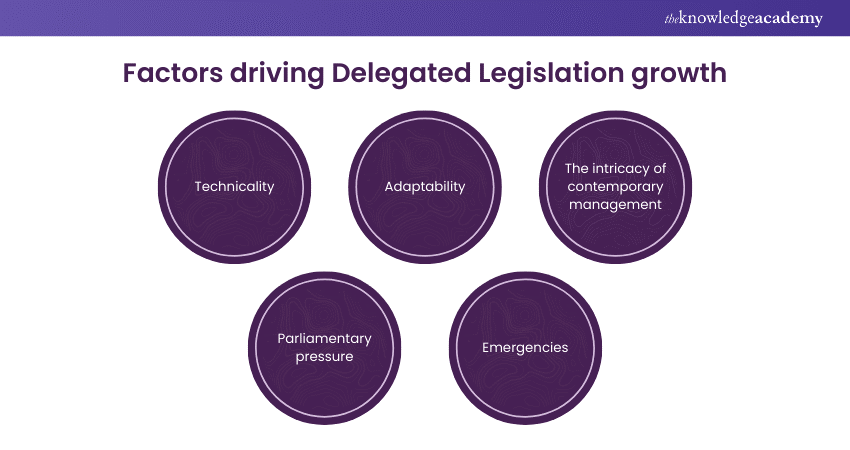We may not have the course you’re looking for. If you enquire or give us a call on +420 210012971 and speak to our training experts, we may still be able to help with your training requirements.
Training Outcomes Within Your Budget!
We ensure quality, budget-alignment, and timely delivery by our expert instructors.

What exactly is Delegated Legislation, and why is it so crucial? Have you ever wondered how governments keep up with the ever-changing complexities of modern society? This system allows for specialised and adaptive governance, ensuring that laws remain relevant and effective.
In this blog, we will discover the concept of Delegated Legislation, its historical evolution, and the various types that exist. We will also delve into the factors responsible for its rapid growth, its benefits, and its drawbacks. Let’s delve into and explore how this legislative process shapes our legal landscape.
Table of Contents
1) What is Delegated Legislation?
2) History of Delegated Legislation
3) Types of Delegated Legislation
4) What are Statutory Instruments?
5) What is Parliament's Role in Delegated Legislation?
6) Factors Influencing the Rapid Growth of Delegated Legislation
7) Advantages and Disadvantages of Delegated Legislation
8) Examples of Delegated Legislation in the UK
9) Conclusion
What is Delegated Legislation?
Delegated Legislation, also known as "subordinate" or "secondary" legislation, is a type of law in the UK that complements primary legislation, such as Acts of Parliament. It is distinct from primary legislation because it is created by Government Ministers or other authorised individuals and bodies, rather than by Parliament itself.
This form of legislation can only be made if specific powers have been granted by an Act of Parliament. Delegated Legislation allows for the creation of detailed rules and regulations, enabling swift and flexible lawmaking without the need for Parliament to pass a new Act for every adjustment or clarification.
History of Delegated Legislation
Historically, Delegated Legislation has developed from straightforward administrative practices into essential frameworks for contemporary governance. Originating with basic statutory instruments in the 19th century, it has grown to include sophisticated regulatory mechanisms today.
This evolution reflects the increasing complexity of governmental and public needs. Consequently, there has been a significant expansion in the scope and impact of Delegated Legislation across various areas of policy and administration.
Develop essential leadership skills with our Leadership Skills Training today!
Types of Delegated Legislation
There are several types of Delegated Legislation, each designed to address specific aspects of law and governance. Here, we explore the main categories that enable efficient and specialised legal administration.

1) Rule
Rules represent the most prevalent type of Delegated Legislation, offering precise directives and guidelines. They function within the parameters set by the primary Legislation. This ensures that subsidiary regulations are directly aligned with the overarching legal framework.
2) Harmony
In Delegated Legislation, harmony ensures that secondary laws correspond with the goals and intentions of the primary Legislation. This alignment helps maintain uniformity and coherence throughout the legal frameworks.
3) By-law
Local governments or specific public authorities enact by-laws under statutory authority. These laws cater to local needs and are enforceable within designated jurisdictions, reflecting the specific requirements and conditions of the area.
4) Control
Control mechanisms in Delegated Legislation provide oversight and ensure accountability. These include requirements such as ministerial approval. Additionally, there is the necessity to lay provisions before Parliament, facilitating checks and balances within the legislative process.
5) Instruments of law
Instruments of law are the various tools through which delegated powers are implemented. These include orders, regulations, and codes of practice, each tailored to address particular issues or areas. This tailoring enables precise and effective application of the law.
Transform your leadership style with our Agile Leadership Training - join now!
What are Statutory Instruments?
Statutory Instruments (SIs) are the most common type of Delegated Legislation. They are created by Ministers or other authorised individuals or bodies who have been granted the power to do so, usually by an Act of Parliament.
An SI serves as a legal tool or "container" that brings into law the specific measures proposed by Ministers or other authorised bodies. These measures often include Regulations, Orders, or Rules.
What is Parliament's Role in Delegated Legislation?
Delegated Legislation can only be created using powers granted by an Act of Parliament (the ‘parent Act’). These powers outline who can make the Delegated Legislation, what it may or must do, the parliamentary scrutiny process it may undergo, and any other requirements for its creation.
Problems with the Process:
There are issues with both the review of the resultant Statutory Instruments (SIs) and the delegation of authority to create Delegated Legislation. This report highlights key problems that need addressing in both areas.
Stages of the Delegated Legislation System:
a) Delegation of Powers: Parliament passes Acts that delegate powers.
b) Use of Powers: Ministers and other authorised bodies use these powers to create Delegated Legislation, primarily through SIs.
Parliament’s Role:
a) First Stage: Parliament passes the Acts that delegate powers.
b) Second Stage: Parliament scrutinises and sometimes must approve many of the SIs created using those powers.
Factors Responsible for the Rapid Growth of Delegated Legislation
Factors have helped to the rapid growth of Delegated Legislation, reflecting the evolving needs and complexities of modern governance.

1) Technicality
Modern governance requires precise Legislation, often beyond what parliaments create, due to its technical complexities. Governance involves intricate and specialist areas, ranging from environmental regulations to digital privacy laws. These areas require expertise that typical legislative bodies might not possess.
Delegated Legislation allows expert bodies or individuals to develop these detailed regulations under the authority of a broader legislative framework. This approach ensures that laws are not only comprehensive but also crafted with the precision necessary to effectively manage complex, technical issues in a rapidly evolving world.
2) Adaptability
Delegated Legislation facilitates swift adjustments to evolving circumstances, including advancements in technology and shifts in societal norms. This agility ensures that the legal framework remains relevant and effective amidst rapid changes, allowing authorities to address emerging issues promptly.
Whether it's updating regulations to accommodate new innovations or responding to shifting public attitudes, Delegated Legislation offers a dynamic and responsive approach to governance. This adaptability is important for maintaining the effectiveness and legitimacy of the legal system in an ever-changing world.
3) The Intricacy of Contemporary Management
The intricacy of contemporary management demands adaptable legal frameworks to navigate the complexities of modern governance. With rapid advancements in technology, global interconnectedness, and diverse societal needs, traditional legislative processes may prove inadequate.
Delegated Legislation offers a solution by empowering authorities to respond swiftly to emerging challenges, enact specialised regulations, and address intricate issues with precision. This flexibility ensures that laws remain relevant and effective in an ever-evolving landscape, allowing governments to meet the demands of their citizens while maintaining regulatory coherence and consistency.
4) Parliamentary Pressure
Parliamentary pressure refers to the influence exerted by legislative bodies on the need for Delegated Legislation. As parliaments grapple with heavy workloads and intricate policy matters, they may delegate certain legislative functions to expedite the process. This pressure can arise from various factors, including time constraints, political priorities, and the need for specialised expertise.
Delegated Legislation enables parliamentarians to focus on overarching policy issues while delegating the details to relevant authorities. Maintaining a balance between parliamentary oversight and administrative efficiency ensures legislative accountability and transparency in Delegated Legislation.
5) Emergencies
During times of crises or emergencies, including natural disasters or public health emergencies, swift action is imperative to safeguard the well-being of citizens. Delegated Legislation provides a vital mechanism for governments to respond promptly and effectively.
By granting authorities the power to enact temporary measures or regulations, Delegated Legislation facilitates the rapid deployment of resources. It allows for the coordination of emergency response efforts and the implementation of necessary protocols or restrictions to mitigate the impact of the crisis. This flexibility ensures that governments can adapt swiftly to unforeseen circumstances, prioritising public safety and welfare above bureaucratic hurdles.
Master People Management and Team Leadership with our Successful People Management And Team Leadership Course!
Advantages and Disadvantages of Delegated Legislation
Here are the advantages and disadvantages of Delegated Legislation:

Advantages of Delegated Legislation
The following are the advantages of Delegated Legislation:
1) Speedy Implementation: Enables rapid legal changes and quick responses to urgent matters, allowing faster adaptation compared to traditional primary legislation.
2) Flexible Amendments: Provides easy modification of regulations to reflect changing requirements and emerging developments without complex legislative procedures.
3) Reduced Parliamentary Workload: Allows Parliament to focus on broader policy issues by delegating detailed regulatory management to specialised bodies, improving overall legislative efficiency.
4) Specialised Procedural Approach: Facilitates sector-specific regulations that can address unique characteristics and demands of different industries with greater precision and technical expertise.
Disadvantages of Delegated Legislation
The following are the disadvantages of Delegated Legislation:
1) Insufficient Time for Review: The sheer volume of secondary legislation can overwhelm Parliament, making it difficult to thoroughly review each statutory instrument. This can result in potentially problematic rules being passed without adequate scrutiny.
2) Political Considerations: Legislative oversight may be influenced by the political composition of parliamentary committees, leading to biased or compromised evaluations of Delegated Legislation.
3) Negative Resolution Procedure: This common procedure allows a statutory instrument to become law unless it is expressly rejected within a specified time frame, usually around 40 days. Critics argue that this approach discourages active parliamentary engagement and scrutiny.
4) Rubber-stamping: Some procedures for Delegated Legislation allow little scope for amendment or discussion, leading to a rubber-stamping effect where parliamentary approval is granted without comprehensive scrutiny.
Enhance your delegation skills with our comprehensive Delegation Training!
Examples of Delegated Legislation in the UK
Delegated Legislation plays a crucial role in shaping the UK’s legal framework across various sectors. Here are some prominent examples:
1) Health and Safety at Work Regulations
Developed by the Health and Safety Executive, these regulations establish laws and requirements to protect employees and the public from potential workplace risks.
2) Building Regulations
Set by the Ministry of Housing, Communities and Local Government, these regulations govern the construction, design, and energy efficiency of buildings, ensuring they meet essential safety and accessibility standards.
3) Environmental Regulations
A range of environmental regulations, such as the Environmental Permitting Regulations and the Air Quality Regulations, set out standards and practices to manage pollution, safeguard natural resources, and address climate change.
4) Taxes and Financial Regulations
Delegated Legislation is also used to set tax rates, thresholds, and reliefs, as well as to regulate financial services and products, ensuring the stability and effectiveness of the UK economy.
Conclusion
Delegated Legislation provides flexibility and efficiency in rulemaking yet raises concerns about accountability and legal complexities. Striking a balance between administrative efficiency and democratic principles is crucial to ensure effective governance and responsiveness to societal needs. This balance is key to ensuring laws are both effective and just.
Equip yourself with Anti-Social Behaviour Management Training - join now!
Frequently Asked Questions

Delegated Legislation can undermine parliamentary supremacy by allowing ministers or bodies to make laws without full parliamentary scrutiny. This potentially bypasses democratic processes and concentrates power in the hands of the executive.

Parliament can control Delegated Legislation through three main methods:
a) Affirmative resolution (approval required)
b) Negative resolution (opposition required to block)
c) Scrutiny committees (examine and report on legislation)

The Knowledge Academy takes global learning to new heights, offering over 30,000 online courses across 490+ locations in 220 countries. This expansive reach ensures accessibility and convenience for learners worldwide.
Alongside our diverse Online Course Catalogue, encompassing 19 major categories, we go the extra mile by providing a plethora of free educational Online Resources like News updates, Blogs, videos, webinars, and interview questions. Tailoring learning experiences further, professionals can maximise value with customisable Course Bundles of TKA.

The Knowledge Academy’s Knowledge Pass, a prepaid voucher, adds another layer of flexibility, allowing course bookings over a 12-month period. Join us on a journey where education knows no bounds.

The Knowledge Academy offers various blogs on Leadership Courses, including Delegation Training, Leadership Skills Course, Agile Leadership Training, Successful People Management And Team Leadership and more. These courses cater to different skill levels, providing comprehensive insights into Team Leadership.
Our Business Skills Blogs cover a range of topics related to Leadership, offering valuable resources, best practices, and industry insights. Whether you are a beginner or looking to advance your Leadership and Management skills, The Knowledge Academy's diverse courses and informative blogs have you covered.
Upcoming Business Skills Resources Batches & Dates
Date
 Delegation Training
Delegation Training
Fri 7th Feb 2025
Fri 4th Apr 2025
Fri 6th Jun 2025
Fri 1st Aug 2025
Fri 3rd Oct 2025
Fri 5th Dec 2025







 Top Rated Course
Top Rated Course



 If you wish to make any changes to your course, please
If you wish to make any changes to your course, please


